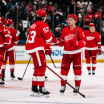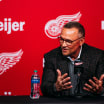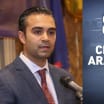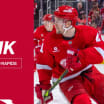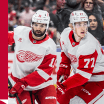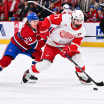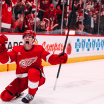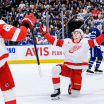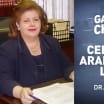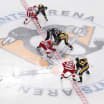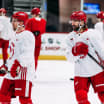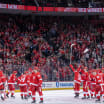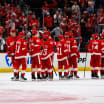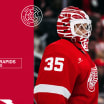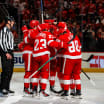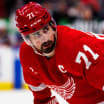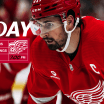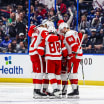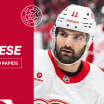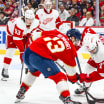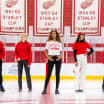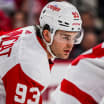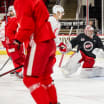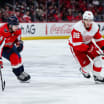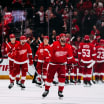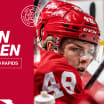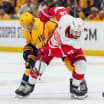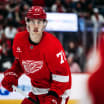DETROIT - This weekend, 'College Hockey at the Joe' will end its illustrious run at Joe Louis Arena when the Big Ten crowns its hockey tournament champion.
For coaches Red Berenson of Michigan and Tom Anastos of Michigan State, it will be the finale of an association with the Joe that dates back to almost day one of the old barn's history.
Ties run deep at Joe Louis for Berenson and Anastos
UM and MSU seek Big Ten hockey title this weekend at the Joe
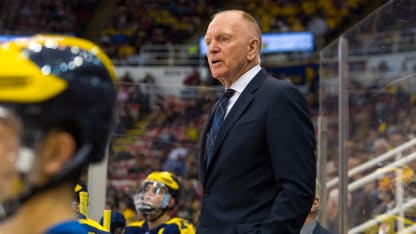
© Daryl Marshke
By
Art Regner / DetroitRedWings.com
Berenson was the head coach of the St. Louis Blues on December 27, 1979, which was the first game the Red Wings ever played at the Joe.
"We came in on a charter and I remember the excitement from a player's standpoint, playing in a new building in Detroit," Berenson said. "The same thing on the trip home, everybody was wowed by the atmosphere and the difference between the Olympia and Joe Louis.
"I was really impressed with the rink. It wasn't the Olympia, but it had some similarities. I know they tried to keep the sight lines steep. It was a newer, brighter, cleaner version (of the Olympia)."
As for the game itself, Berenson recalls that the Wings were a good hockey team, not a great team, and they played well but Blues goalie Mike Liut was "the difference maker" as St. Louis skated to a 3-2 victory over Detroit.
Anastos, a Dearborn native, has several vivid memories of the Joe, which spans pretty close to his entire lifetime.
"My first event that I attended there was the NHL All-Star game (February 5, 1980) and I remember being moved," Anastos said. "I was there with my dad and I'll never forget when Gordie Howe was announced out on the ice. The crowd just went crazy.
"The building was new and he was in the twilight of his career, he was playing for Hartford at the time. He was the last guy introduced and walks through the bench and onto the blueline and the place just erupted. I knew Gordie Howe was a great player, but I didn't see him play during the real highlight time of his career."
As a youth, Anastos developed into an elite level player and was drafted by the London Knights of the Ontario Hockey League, but he decided to play for iconic coach Ron Mason at Michigan State.
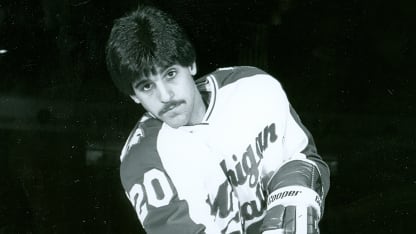
MSU was becoming a national powerhouse under Mason and Anastos and his fellow Spartans began an impressive reign over Joe Louis.
"I never played at Joe Louis until I was in college. My first game there was in the Great Lakes Invitational (GLI) tournament in December of 1981, it was my freshman year," Anastos recalled. "In fact the only game I ever lost playing at Joe Louis Arena was the first game I played. I think we played Michigan Tech, you try and block out those losses and I think we lost in the semifinal and we tied Michigan in the consolation game.
"Every game I played there after - the CCHA (Central Collegiate Hockey Association) tournament that year, the GLIs and the CCHA tournaments every year after, we won every game, every event."
While Anastos and the Spartans were dominating college games played at the Joe, Berenson was regularly coming to Joe Louis as an NHL coach. First as the head man for the Blues and later as an assistant under Scotty Bowman in Buffalo.
But it wasn't until he took the head coaching job at his alma mater, Michigan, in 1984, that he begin to see the impact the Joe had on the sport of hockey, especially college hockey.
"Joe Louis Arena is one of the few NHL buildings in the country that is partially responsible for giving college hockey the credibility it enjoys now," Berenson said. "It was a struggle to get our games on TV in those days, but to play in an NHL building on a regular basis; every year in the GLI, every year in the CCHA Championship and then the rivalry game every year with Michigan State, that just gave college hockey the credibility."
Credibility wasn't on Berenson's mind back in 1984 when he inherited a Michigan program that was a mess. Rumors were circulating that Michigan athletic director, Don Canham, was thinking about taking away hockey's varsity status and busting it down to a club sport.
Respectability was Berenson's goal in the beginning and it would take him until 1988 to turn the Wolverines around in a game played at Joe Louis Arena.
"Michigan State was the team to beat when I got here and it was clear they were ahead of us," Berenson said. "But when we finally got to a championship game in the GLI, we were playing North Dakota and we were down 5-1 in the game and we got back in the game and it went into overtime.
"Mike Moes went down the ice on the wing and he faked a shot on Russ Parent, their All-American defenseman, he (Moes) got him to bite on the shot and toe dragged the puck around him, went in and scored top shelf and we were all stunned, we couldn't believe we finally won the GLI. It was a huge event and after that we started to take it for granted that we were going to win that every year."
Beating North Dakota at Joe Louis began a string of nine consecutive GLI championships for the Wolverines. It also signaled Michigan's arrival as a major player in the college hockey landscape.
For Anastos, 1984 was also a significant year. Michigan State played Michigan Tech for the GLI championship and it is the game that Anastos will never forget from his playing days as a Spartan and it had nothing to do with MSU winning their third straight GLI title.
"I never have played in a game where there were so many people," Anastos said. "The announced crowd of 21,000 something (21,576), it may be to this day the most people to ever watch a game at Joe Louis Arena.
"There were people everywhere, at that time it was the largest crowd to watch a game in North America, that's pretty mind-blowing for a college athlete. I thought we were playing in front of big crowds when we were playing in front of 6,000. Our rink had 6,000, Minnesota had 6,000, Wisconsin had 7 or 8,000, those were the biggest buildings in all of college hockey.
"So we're going into a place where they were sitting in the aisleways. I remember looking up into the rink and you couldn't see the aisleways, they blew away the fire codes at that time."
After his college playing days were over, Anastos was an assistant and eventually the head coach at Michigan-Dearborn, an assistant at Michigan State and was named the Spartans head coach in 2011.
He also cultivated a successful business career, but it was his tenure as the commissioner of the CCHA from 1988-2011 when his relationship with Joe Louis took on another dimension.
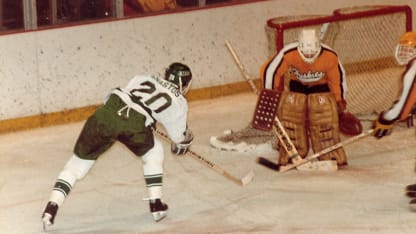
"Those were terrific years and those were years of great growth because you saw a lot of growth in the CCHA, we really saw some programs break out on a national level," Anastos said. "And Joe Louis was the centerpiece, we started our year down there, we launched our annual press day down there to begin our season and it all culminated with the CCHA championship."
Anastos' vision was only half of the story of making the CCHA the most innovative college hockey conference. If it wasn't for the commitment from Mike and Marian Ilitch and the Ilitch organization, the growth of college hockey in the region would have definitely been stunted.
"They (Mr. & Mrs. I) did everything they could to not only help us to host events, but to make it first class to those that participated and help to fill that building to raise the profile of the CCHA and college hockey," Anastos said. "The Illitches were right out front when they bought the Red Wings and they had that building and they really embraced college hockey. They brought the NCAA tournament there in addition to the GLI. They brought additional games there, the Michigan State-Michigan game.
"At one time they were helping out Lake Superior's program, they brought Lake Superior in to play either Michigan State or Michigan. It became that whole 'College Hockey at the Joe' thing."
Berenson believes the CCHA's slogan of 'College Hockey at the Joe,' served as a huge motivational factor for the other CCHA schools not named Michigan or Michigan State.
"Just think about it. The Alaska schools that got to play at Joe Louis because of the CCHA playoffs," Berenson said. "All the teams knew whether it was Lake Superior or Northern Michigan, they knew if they had a good season and a good playoff they were going to get to play at Joe Louis Arena. They didn't have the luxury of playing the GLI there or a rivalry game there. When they got to Joe Louis, it might be once in so many years.
"So there are a lot of players that were really thrilled and privileged to play in that building, whether it was a new building or an old building, it was still Joe Louis Arena, where (Steve) Yzerman played and (Nick) Lidstrom and all the great Red Wing players and teams and all the visiting players as well."
On Thursday at Joe Louis Arena, Michigan State and Michigan begin their quest for the Big Ten hockey tournament title. The No. 6 seed Spartans will play No. 3 seed Ohio State at 4:30 p.m. and No. 5 Michigan faces No. 4 Penn State at 8 p.m.
Each school has had a disappointing year and both coaches know the task of winning the title and an automatic bid to the NCAA Tournament is daunting, but they remain cautiously optimistic.
"We're dealing with what the Red Wings are dealing with, whether it's goal scoring challenges, special teams challenges, our margin for error is super slim," Anastos said. "We haven't been able to make many breaks and yet, we've played a lot of really good minutes and our biggest challenge particularly this year has been the level of inconsistency.
"In a tournament like this, when you're in a one-and-done, a hot goalie, who knows? The sky's the limit. For us at this stage of the game, I have to carry around a glass slipper in my pocket. We need to be Cinderella."
UM swept Penn State last weekend in Ann Arbor and have won four of its last five games, but Berenson isn't buying into the theory that Michigan has finally turned the corner this late in the season.
"We have not been outplaying the other team, but we have been capitalizing on our chances and our goalie has been making the difference," Berenson said. "We have a little more confidence than we did a week ago. I can't tell you we're on a major roll. We still have a lot to prove.
"Penn State is fighting for their NCAA (tournament) lives. They're in the tournament now or on the bubble and we're a team trying to advance in the tournament (Big Ten) and see if we can be like the Michigan basketball team. We would play three games in three nights, but we have to win the first game before we move on."
Eventually, Berenson, Anastos and their teams will coach or play their last game ever at the Joe this weekend and though they each have many fond memories of the arena, they will have a different mindset from one another when they exit the building for the very last time.
"I can tell you right now that will be the last thing on my mind (coaching his last game at the Joe) because we'll be so focused on the game or the outcome of the game, the last game we play, whether it's Thursday, Friday or Saturday," Berenson said. "But there will still be conversations about Joe Louis, but at the time you're just in touch with the game itself, not so much the history."
Growing up in Dearborn, Anastos will be extremely reflective when he has to say goodbye to the Joe.
"It won't be any one single moment, it will be a compilation of years of memories that I think I will try and reflect on," Anastos said. "I have thought about it. I have shared so many memorable experiences there, I coached my kids' teams there for the Little Caesars league championship, I coached and played there, as an administrator I have presented trophies out on that ice. I have seen championships, Stanley Cups and college championships. The people that I've worked with there are very memorable to me.
"I compare it to the last Tiger game I went to (at Tiger Stadium). I'm nostalgic, I like the old stuff, I like the old buildings and the nuances of them, but I remember being in Tiger Stadium and thinking, 'I wish they wouldn't move.' But then I remember walking around and thinking, 'It's time, it's just time,' and that's how it is with this building.
"There are tons of great memories but it's time, the new building will be spectacular, it's opening at such a great time with the city having so much momentum going."
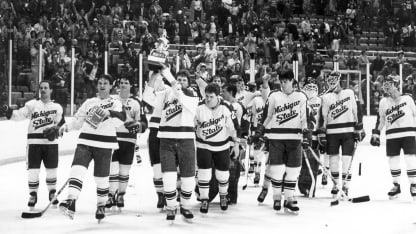
Perhaps that momentum will carry over onto the ice for Michigan and Michigan State and on Saturday night they could meet for the Big Ten championship.
It would certainly be a fitting way to say farewell to college hockey at the Joe.



